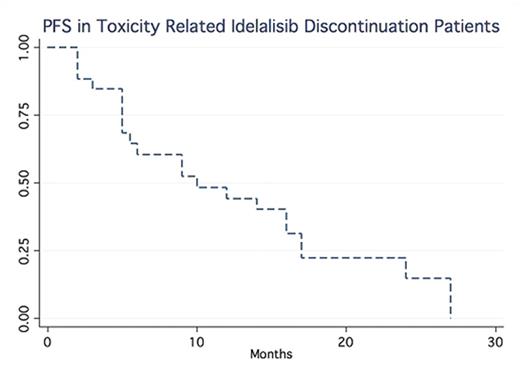Abstract
Introduction: Idelalisib is a PI3K delta inhibitor (KI) approved in combination with rituximab for treating relapsed CLL. Associated toxicities such as transaminitis, diarrhea/colitis, pneumonitis, and infection limit utilization of idelalisib. Notably, these toxicities often lead to permanent drug discontinuation with uncertain outcomes following drug interruption and/or termination. Information on depth and duration of response following idelalisib discontinuation is essential when considering time-limited approaches in study design. To address this gap, 10 large US cancer centers collaborated to capture the experience of 61 CLL pts treated with idelalisib-based therapy.
Patients and Methods: We conducted a multicenter retrospective cohort study of CLL patients treated with idelalisib as first KI. The primary study endpoint was progression free survival (PFS) after idelalisib discontinuation. PFS was defined as time from post-idelalisib treatment to progression or last follow up. We analyzed patient characteristics and outcomes, focusing on: demographics, number of prior therapies, time on therapy, toxicity associated with discontinuation, time to next treatment, and response. Kaplan-Meier method was used to estimate survival outcomes. Log rank test was used to compare survival outcomes. This study is unfunded.
Results: A total of 61 CLL patients were identified. Median follow up for the cohort was 10.5 months (range .5-42). Median age was 65 years (35-80). Of these, 31% were del(17p) positive, 24% del(11q) positive, and 24% had a complex karyotype (≥ 3 abnormalities). Median number of prior therapies was 2 (ranging 0-7); median time from diagnosis to idelalisib initiation was 80 months (ranging 1-144). 23% of patients required dose modifications and 50% held the drug prior to discontinuation. The overall idelalisib discontinuation rate was 95% (n=58), toxicity was the most common reason for discontinuation (45%) followed by progression of CLL (26%). The three most common toxicities leading to discontinuation were pneumonitis (37%), colitis (32%), and rash (27%). Median time to discontinuation was 5 months (range .5-22) in the setting of toxicity and 12.5 months (range 3-42) in the setting of CLL progression. The best idelalisib responses recorded prior to discontinuation due to toxicity were 84.5% ORR (CR, PR, PL-L) and 3.8% CR. Median PFS was 12 months for the entire cohort. When stratified by discontinuation reason: median PFS was 10 months and OS not reached (idelalisib toxicity group) and median PFS was 13 months and OS was 48 months (CLL progression group). PFS was not statistically significantly different between groups when stratified by reason for discontinuation (p=.24, LR test). Following idelalisib discontinuation, 65% of patients whose course was limited by toxicity have gone on to be treated with a subsequent line of therapy.
Conclusions: Toxicity remains the most common reason for idelalisib discontinuation followed by CLL progression. Our data suggests toxicity may be minimized when treatment duration was limited to less than 6 months since many treatment-limiting toxicities occurred beyond that time point. Most patients (> 80%) discontinued in the setting of PR, had durable responses and were able to undergo subsequent treatment regimens. Responses appear to be nearly as durable in the setting of limited treatment exposure (toxicity cohort, median exposure = 5 months, PFS 10 months) as opposed to a treat-to-progression approach (median exposure = 12.5 months, PFS 13 months). Consideration of intermittent / time-limited dosing with idelalisib may be a viable strategy.
Brander: Teva Pharmaceuticals, Genentech, AbbVie, Pharmacyclics: Consultancy; Genentech: Consultancy; AbbVie: Consultancy, Membership on an entity's Board of Directors or advisory committees; TG Therapeutics: Consultancy, Membership on an entity's Board of Directors or advisory committees. Lamanna: Gilead: Membership on an entity's Board of Directors or advisory committees, Research Funding. Ujjani: Gilead: Consultancy; Abbvie: Research Funding, Speakers Bureau; Genentech: Consultancy; Pharmacyclics: Consultancy, Research Funding. Skarbnik: Abbvie: Other: Ad board, Speakers Bureau; Seattle Genetics: Speakers Bureau; Novartis: Speakers Bureau; Genentech: Speakers Bureau; Gilead: Speakers Bureau. Cheson: AbbVie, Roche-Genentech, Pharmacyclics, Acerta: Consultancy; Acerta, Pharmacyclics, Epizyme, Gilead, Roche, AbbVi: Other: Institution receives research support . Dwivedy Nasta: Takeda: Research Funding; Immunogen: Research Funding; Incyte: Research Funding. Svoboda: Seattle Genetics: Consultancy, Research Funding; Kite: Consultancy; Pharmacyclics: Research Funding; Celgene: Research Funding; BMS: Consultancy, Research Funding; Merck: Research Funding. Landsburg: Takeda: Research Funding; Curis: Consultancy, Research Funding. Schuster: Celgene: Consultancy, Research Funding; Gilead: Consultancy, Research Funding; Genentech: Consultancy, Research Funding; Janssen: Consultancy, Honoraria; Bristol-Myers Squibb: Consultancy, Research Funding; Novartis: Consultancy, Research Funding; Nordic Nanovector: Consultancy; Merck: Research Funding; Seattle Genetics: Consultancy. Barr: Seattle Genetics: Consultancy; Novartis: Consultancy; Gilead: Consultancy; Infinity: Consultancy; Celgene: Consultancy; AbbVie: Consultancy, Research Funding; Pharmacyclics LLC, an AbbVie Company: Consultancy, Research Funding. Mato: TG Therapeutics: Membership on an entity's Board of Directors or advisory committees, Research Funding; Celgene: Consultancy, Membership on an entity's Board of Directors or advisory committees; AstraZeneca: Consultancy; Janssen: Consultancy; AbbVie: Consultancy, Research Funding; DTRM: Research Funding; Acerta: Research Funding; Portola: Research Funding; Gilead Sciences, Inc.: Membership on an entity's Board of Directors or advisory committees; Pharmacyclics: Research Funding; Regeneron: Research Funding; Kite: Consultancy.
Author notes
Asterisk with author names denotes non-ASH members.


This feature is available to Subscribers Only
Sign In or Create an Account Close Modal